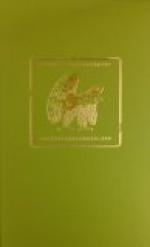CHAPTER X
A WOMAN’S HEART-STRINGS
“Now I know the meaning of Wenatchee. It’s something racy, Mr. Tisdale, and a little wicked, yet with unexpected depths, and just the coolest, limpid hazel-green.”
Tisdale’s pulses quickened; his blood responded to her exhilaration. “Yes, only”—and he waited to catch the glance she lifted from the stream—“your green is blue, and you forgot to count the sparkles in.”
As he spoke, the bays paced off the bridge. They sprang, gathering themselves lightly for a sharp ascent and for an interval held the driver’s close attention. The town and the Columbia were behind, and the road, which followed the contour of the slopes rising abruptly from the Wenatchee, began a series of sudden turns; it cut shelf-wise high across the face of a ridge; spurs constantly closed after them; there seemed no way back or through, then, like an opening gate, a bluff detached from the wall ahead, and they entered another breadth of valley. In the wide levels that bordered the river, young orchards began to supplant the sage. Looking down from the thoroughfare, the even rows and squares seemed wrought on the tawny background like the designs of a great carpet. Sometimes, paralleling the road, the new High Line canal followed an upper cut; it trestled a ravine or, stopped by a rocky cliff, bored through. Where a finished spillway irrigated a mountainside, all the steep incline between the runnels showed lines on lines of diminutive trees, pluckily taking root-hold.
A little after that, near an old mission, they dropped to a lower bench and passed an apple orchard in full bearing. Everywhere boughs laden with a gold or crimson harvest were supported by a network of scaffolding. It was marvelous that fruit could so crowd and cling to a slender stem and yet round and color to such perfection. Miss Armitage slowed the horses down and looked up the shady avenues. Presently a driveway divided the tract, leading to a dwelling so small it had the appearance of a toy house; but on the gatepost above the rural delivery box the name of the owner shone ostentatiously. It was “Henderson Bailey, Hesperides Vale.”
“Do you see?” she asked. “This is that station master’s orchard, where the Rome Beauty grew.”
But the team was troublesome again. The road made a turn, rounding the orchard, and began the descent to a bridge. On the right a great water-wheel, supplied with huge, scoop-shaped buckets, was lifting water from the river to distribute it over a reclaimed section. The bays pranced toward it suspiciously. “Now, now, Tuck,” she admonished, “be a soldier.” The colt sidled gingerly. “Whoa, Nip, whoa!” and, rearing lightly, they took the approach with a rush.
As they quieted and trotted evenly off the bridge, a large and brilliant signboard set in an area of sage-brush challenged the eye. Miss Armitage fluted a laugh.




